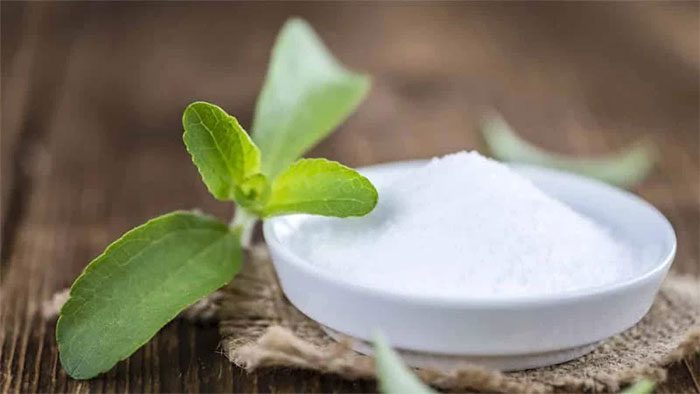There are certain types of sugars that not only do not raise blood glucose levels but are also beneficial for health. Stevia is one of them.
Many people believe that diabetic patients must completely avoid all sweet foods, especially sugar and honey. However, this is not entirely true, as there are some types of sugars that not only do not increase blood glucose levels but also promote health. Stevia is one of them.
According to Dr. Dang Ngoc Hung (Institute of Nutrition Research and Consultancy): “People with diabetes or those on a diet to lose weight should prioritize using stevia.”
The expert revealed that this is a natural sweetener and is not classified as a sugar. While it is 300 times sweeter than regular sugar, it does not produce energy. Therefore, it can help diabetic patients satisfy their sweet cravings without worrying about harming their health.

Stevia is a low-calorie sweetener with antioxidant and anti-diabetic properties.
“Today, many health organizations, including the FDA in the United States, have approved stevia as a safe sweetener. Therefore, in cases where we want to control blood sugar for diabetics or wish to lose weight, it is highly recommended to use this type of sugar,” Dr. Dang Ngoc Hung stated.
What is Stevia?
Stevia is the English name for this sweetener. It is a low-calorie sweetener with antioxidant and anti-diabetic properties. It has been approved by the U.S. Food and Drug Administration (FDA).
Stevia contains compounds known as steviol glycosides, which are 150-300 times sweeter than cane sugar. However, stevia is so low in calories that scientifically, it is considered a “calorie-free” product.
The American Heart Association (AHA) and the American Diabetes Association (ADA) state that stevia may benefit individuals with diabetes when used appropriately. In a 2018 study, experts tested the effects of coconut jelly sweetened with stevia. The results showed that blood sugar levels in those consuming this coconut jelly began to decrease 60-120 minutes after eating it, even before insulin was released.

Stevia contains compounds called steviol glycosides that are 150–300 times sweeter than cane sugar.
Unlike artificial sweeteners and sugars, stevia can help stabilize your plasma glucose levels and significantly enhance glucose tolerance.
Stevia also has the ability to increase insulin production, enhance insulin’s effectiveness on cell membranes, stabilize blood sugar levels, and prevent type 2 diabetes and its complications.
Replacing regular sugar with stevia can also reduce the total calorie intake, which may assist in weight loss. Excessive weight is a risk factor for type 2 diabetes and its complications, including heart and kidney issues.
How Should Diabetic Patients Use Diet Sugars?
Doctors warn patients not to think that diet sugars can be consumed freely. They can lower blood pressure to dangerously low levels or interact with medications that reduce blood sugar.

Stevia has the ability to increase insulin production and enhance insulin’s effectiveness on cell membranes.
When choosing foods containing stevia, it is also important to consider other ingredients to ensure they are healthy.
In general, diabetic patients do not necessarily need to completely eliminate sugar, but they must be mindful of their sugar intake. Furthermore, diabetic patients should strive to diversify their daily diet. It is best for patients to consume some fruits and vegetables without added sugar to help supplement fiber, promote bowel movements, and delay increases in blood sugar.
For this group of patients, regular health monitoring is crucial to manage their condition.
Everyone can consult with their doctor or a nutrition expert for advice on the best dietary plan for themselves.



















































